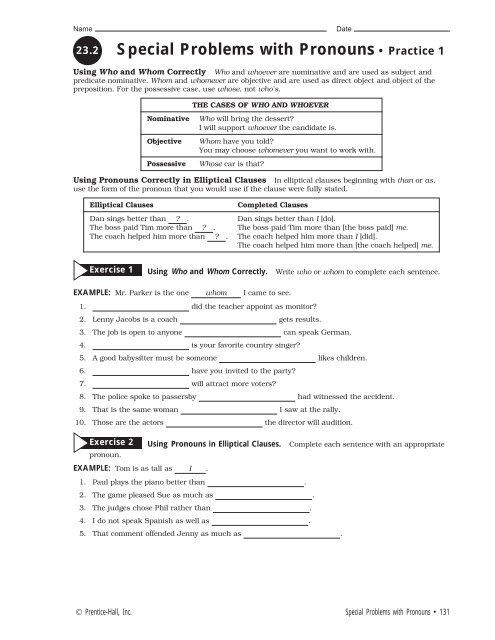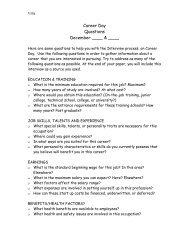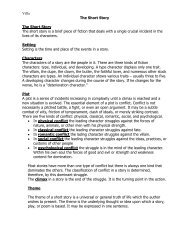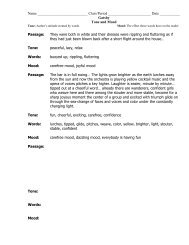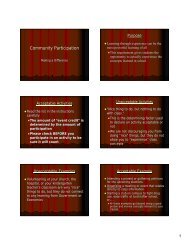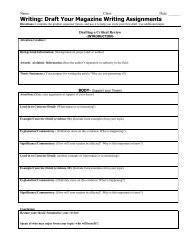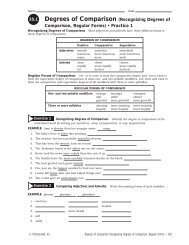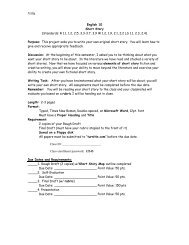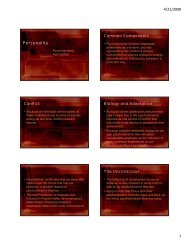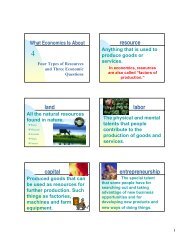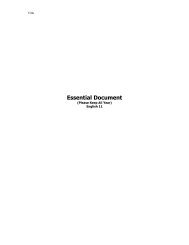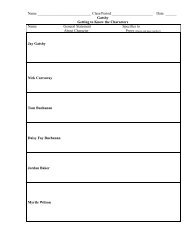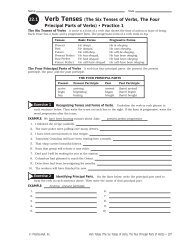Create successful ePaper yourself
Turn your PDF publications into a flip-book with our unique Google optimized e-Paper software.
Name<br />
Date<br />
23.2 Special Problems with Pronouns • Practice 1<br />
Using Who and Whom Correctly Who and whoever are nominative and are used as subject and<br />
predicate nominative. Whom and whomever are objective and are used as direct object and object of the<br />
preposition. For the possessive case, use whose, notwho’s.<br />
THE CASES OF WHO AND WHOEVER<br />
Nominative<br />
Objective<br />
Possessive<br />
Who will bring the dessert<br />
Iwillsupportwhoever the candidate is.<br />
Whom have you told<br />
You may choose whomever you want to work with.<br />
Whose car is that<br />
Using Pronouns Correctly in Elliptical Clauses In elliptical clauses beginning with than or as,<br />
use the form of the pronoun that you would use if the clause were fully stated.<br />
Elliptical Clauses<br />
Completed Clauses<br />
Dan sings better than . Dan sings better than I [do].<br />
ThebosspaidTimmorethan . The boss paid Tim more than [the boss paid] me.<br />
The coach helped him more than . The coach helped him more than I [did].<br />
The coach helped him more than [the coach helped] me.<br />
Exercise 1 Using Who and Whom Correctly. Write who or whom to complete each sentence.<br />
EXAMPLE: Mr. Parker is the one whom I came to see.<br />
1. did the teacher appoint as monitor<br />
2. Lenny Jacobs is a coach gets results.<br />
3. The job is open to anyone can speak German.<br />
4. is your favorite country singer<br />
5. A good babysitter must be someone likes children.<br />
6. have you invited to the party<br />
7. will attract more voters<br />
8. The police spoke to passersby had witnessed the accident.<br />
9. That is the same woman I saw at the rally.<br />
10. Those are the actors the director will audition.<br />
Exercise 2 Using Pronouns in Elliptical Clauses. Complete each sentence with an appropriate<br />
pronoun.<br />
EXAMPLE: Tom is as tall as I .<br />
1. Paul plays the piano better than .<br />
2. ThegamepleasedSueasmuchas .<br />
3. ThejudgeschosePhilratherthan .<br />
4. I do not speak Spanish as well as .<br />
5. That comment offended Jenny as much as .<br />
© Prentice-Hall, Inc. Special Problems with Pronouns • 131
Name<br />
Date<br />
26.1 Negative Sentences • Practice 1<br />
Recognizing Double Negatives<br />
Do not write sentences with double negatives.<br />
Double Negatives<br />
I haven’t seen no one.<br />
I haven’t done nothing wrong.<br />
We don’t have no school today.<br />
Correct Negative Sentences<br />
I haven’t seen anyone.<br />
I have seen no one.<br />
I haven’t done anything wrong.<br />
Ihavedonenothing wrong.<br />
We don’t have school today.<br />
We have no school today.<br />
Forming Negative Sentences Correctly Use only one negative word in a single clause. Do not use<br />
but in its negative sense with another negative. Do not use barely, hardly, orscarcely with another<br />
negative.<br />
More Double Negatives<br />
Didn’t Ann say she couldn’t find nobody <br />
I haven’t but adollar.<br />
We didn’t have hardly any food left.<br />
Correct Negative Sentences<br />
Didn’t Ann say she couldn’t find anybody<br />
Didn’t Ann say she could find nobody<br />
Ihavebut a dollar.<br />
I haven’t more than a dollar.<br />
We had hardly any food left.<br />
We didn’t have any food left.<br />
Exercise 1 Avoiding Problems with Negatives. Underline the word(s) in parentheses that<br />
make each sentence negative without creating a double negative.<br />
EXAMPLE: I couldn’t find my keys (anywhere, nowhere).<br />
1. You shouldn’t have told (anybody, nobody) where we were going.<br />
2. We (could, couldn’t) hardly make our way through the brush.<br />
3. Are you sure you (don’t have, have) but one day free this week<br />
4. There wasn’t (a, no) cloud in the sky.<br />
5. Jo didn’t have (any, no) trouble choosing a topic.<br />
6. The article didn’t include (any, no) biographical information.<br />
7. I don’t have room for (but, more than) one elective in my schedule.<br />
8. Kelly can’t (ever, never) finish anything on time.<br />
9. There (was, wasn’t) scarcely enough breeze to ruffle a leaf.<br />
10. I have hardly (ever, never) been more moved by a play.<br />
Exercise 2 Using Negatives Correctly. Write a sentence of your own, correctly using each<br />
negative word given.<br />
1. (nothing)<br />
2. (but)<br />
3. (wouldn’t)<br />
4. (barely)<br />
5. (never)<br />
© Prentice-Hall, Inc. Negative Sentences • 153
Name<br />
Date<br />
26.2 Common Usage Problems • Practice 1<br />
Solving Usage Problems Study the items in the usage glossary in your textbook, paying particular<br />
attention to similar spellings, words that should never be used, pairs that are often misused, and problems<br />
with verb forms.<br />
TYPES OF PROBLEMS<br />
Similar Spellings all ready and already farther and further<br />
Wrong Words alot enthused<br />
Misused Pairs anxious and eager teach and learn<br />
Verb Forms busted for burst of for have<br />
Exercise 1 Avoiding Common Usage Problems. Underline the word in parentheses that<br />
correctly completes each sentence.<br />
EXAMPLE: I would (advice, advise) you to be careful what you say to him.<br />
1. The real painting looks quite different (from, than) the reproductions.<br />
2. Because I had (laid, lay, lain) in the sun too long, my skin felt tight.<br />
3. I would (have, of) gotten here sooner if the car hadn’t broken down.<br />
4. The new tax bill would (affect, effect) all income levels.<br />
5. The candidate mingled (among, between) the guests at the benefit.<br />
6. Nick watches television endlessly, (irregardless, regardless) of what is on.<br />
7. Last weekend our team (beat, won) the Raiders again.<br />
8. Proper food, rest, and exercise help build (healthful, healthy) bodies.<br />
9. I heard (that, where) the Keenans are moving to Detroit.<br />
10. Did your uncle (learn, teach) you that magic trick<br />
Exercise 2 Avoiding Other Usage Problems. Underline the word(s) in parentheses that<br />
correctly complete each sentence.<br />
EXAMPLE: Marcia’s ideas (about, as to) decorations sounded exciting.<br />
1. We were all (anxious, eager) to begin our vacation.<br />
2. The press has given (all together, altogether) too much attention to the candidate’s family.<br />
3. By the time we arrived, there was (nowhere, nowheres) to sit.<br />
4. The van driver (sat, set) the old woman’s packages on her porch.<br />
5. (Because, Being that) we overslept, Mom drove us to school.<br />
6. Harry was surprised that his parents (left, let) him go on the trip.<br />
7. Students (who, which) have permission slips may go on the trip.<br />
8. I was surprised that little Teddy could walk such a long (way, ways).<br />
9. Damian studies harder (than, then) many of his classmates.<br />
10. Hilda’s grandparents (emigrated, immigrated) from Germany.<br />
© Prentice-Hall, Inc. Common Usage Problems • 155
Name<br />
Date<br />
27.1 Rules for Capitalization (for Titles, in Letters)<br />
• Practice 1<br />
Capitals for Titles Capitalize titles of people and titles of works.<br />
People<br />
Social: Lord and Lady Grantford<br />
Business: Superintendent Meyers<br />
Military: Captain McGrath<br />
Government: Mayor Jane Sims<br />
Religious: Rabbi Feldman<br />
Compound: Commander-in-Chief<br />
Abbreviations: Dr.,Mrs.,Jr.,Ph.D.<br />
Works<br />
Book: Peter Rabbit<br />
Periodical: News Digest<br />
Poem: “The Raven”<br />
Story: “A Day’s Wait”<br />
Painting: Christina’s World<br />
Music: The Nutcracker Suite<br />
Courses: English Composition II<br />
Capitals in Letters<br />
letter closings.<br />
Capitalizethefirstwordandallnounsinlettersalutationsandthefirstwordin<br />
Salutations<br />
Dear Aunt Eleanor,<br />
Dear Senator Williams:<br />
My dear Friend,<br />
Closings<br />
Your loving niece,<br />
Sincerely yours,<br />
Yours truly,<br />
Exercise 1 Using Capitals in Titles. Underlinethewordsthatshouldbecapitalizedineach<br />
sentence.<br />
EXAMPLE: The prime of miss jean brodie is set in a girls’ boarding school.<br />
1. Has major adams approved the plan<br />
2. Have you ever read “the ransom of red chief”<br />
3. Some of the world’s most precious jewels belong to the queen of england.<br />
4. We heard professor harold jenkins lecture on politics last night.<br />
5. That is a reproduction of the last supper.<br />
6. Leon has misplaced his script for arsenic and old lace.<br />
7. The new pastor is father riley.<br />
8. Either mrs. pauling or dr. o’rourke will make the presentation.<br />
9. Have you seen a copy of undersea world, the new scuba diving magazine<br />
10. The first selection will be handel’s water music.<br />
Exercise 2 Using Capitals for Salutations and Closings. Rewrite each of the following letter<br />
parts, adding the missing capitals.<br />
EXAMPLE: dear uncle albert, Dear Uncle Albert,<br />
1. dear dr. morgan,<br />
6. dear professor atkins:<br />
2. with deep affection,<br />
7. yours sincerely,<br />
3. gratefully,<br />
8. dearsirormadam:<br />
4. my dear cousin,<br />
9. my dear marian,<br />
5. very truly yours,<br />
10. with all good wishes,<br />
© Prentice-Hall, Inc. Rules for Capitalization (for Titles, in Letters) • 161
Name<br />
Date<br />
28.3 Semicolons and Colons (Uses of the Colon)<br />
• Practice 1<br />
Uses of the Colon Use a colon to introduce a list of items after an independent clause; a quotation that<br />
is formal, lengthy, or lacking a “he said/she said” expression; a sentence that summarizes or explains the<br />
sentence before it; or a formal appositive that follows an independent clause.<br />
INTRODUCTORY COLONS<br />
List<br />
Quotation<br />
Summary Sentence<br />
Formal Appositive<br />
The arrangement consisted entirely of spring flowers: irises, daffodils,<br />
tulips, and hyacinths.<br />
Ellen waved goodbye: “Have a good trip.”<br />
The paper reported the election results: All three present school board<br />
members were unseated.<br />
The class play will be an American classic: Our Town<br />
In addition, use a colon in the following special situations.<br />
OTHER USES OF THE COLON<br />
Numerals Giving Time 8:17 A.M. 11:57 P.M.<br />
Periodical References<br />
National Geographic XI: 421 (volume: page)<br />
Biblical References<br />
I Corinthians 13: 4–13 (chapter: verse[s])<br />
Subtitles<br />
Pierre: A Cautionary Tale<br />
Salutations in Business Letters Dear Ms. Adamson:<br />
Gentlemen:<br />
Labels Signaling Important Ideas Caution: Keep this and all medications out of the reach of children.<br />
Exercise 1 Using Colons Correctly. Add colons where they are needed in the following<br />
sentences.<br />
EXAMPLE: The recipe calls for three basic spices garlic, parsley, and thyme.<br />
The recipe calls for three basic spices: garlic, parsley, and thyme.<br />
1. Jeremy unfolded the note “Meet me in the gym after school.”<br />
2. The express, which was due at 8 14, did not arrive until 9 00 P.M.<br />
3. Two actors have refused Academy Awards George C. Scott and Marlon Brando.<br />
4. The three magazines with the largest paid subscriptions last year were these TV Scene, Reader’s<br />
Review, andNational Reflections Magazine.<br />
5. Warning This cabinet contains dangerous electrical equipment.<br />
Exercise 2 More Work with Colons. Follow the directions in Exercise 1.<br />
1. The text of the sermon was Matthew 10 8.<br />
2. I am reporting on a biography titled Gandhi Fighter Without a Sword.<br />
3. Caution Read this manual completely before using your power sled.<br />
4. Flight 401 leaves LaGuardia Airport at 8 40 A.M. each weekday.<br />
5. The president banged the gavel “Let the meeting come to order.”<br />
© Prentice-Hall, Inc. Semicolons and Colons (Uses of the Colon) • 173
Name<br />
Date<br />
28.5 Hyphens • Practice 1<br />
Using Hyphens Use a hyphen when writing out numbers from twenty-one through ninety-nine and<br />
with fractions used as adjectives. Also use hyphens with certain prefixes and compound words, with<br />
compound modifiers (except those ending with-ly ) before nouns, and to avoid confusion.<br />
USES OF HYPHENS<br />
With Numbers<br />
With Prefixes<br />
With Compound Nouns<br />
With Compound Modifiers<br />
For Clarity<br />
twenty-eight flavors, one-fourth cup<br />
pro-American, self-conscious, ex-governor<br />
mother-in-law, passer-by, merry-go-round<br />
best-dressed performer, well-manicured lawn, tie-dyed shirt, carefully<br />
maintained yard<br />
re-cover versus recover, five-acre lots versus five acre-lots<br />
Using Hyphens at the Ends of Lines Divide words only between syllables. A word with a prefix or<br />
suffix can almost always be divided between the prefix and root or root and suffix. Divide a hyphenated<br />
word only after the hyphen. Do not divide a word so that only one letter stands alone. Do not divide proper<br />
nouns or adjectives, and do not carry part of a word over to another page.<br />
HYPHENS AT THE ENDS OF LINES<br />
Correct thor-ough un-happy ex-officer de-part ques-tion English<br />
Incorrect tho-rough unh-appy ex-of-ficer a-part ver-y Eng-lish<br />
Exercise 1 Using Hyphens. Place hyphens where they are needed. (Not all sentences need<br />
hyphens.)<br />
EXAMPLE: Jeremy is an all around athlete.<br />
Jeremy is an all-around athlete.<br />
1. The sergeant at arms asked the demonstrators to leave the meeting.<br />
2. Alison’s half hearted response disappointed us.<br />
3. Of the twenty four bottles in the case, three were broken.<br />
4. You will need five eighths yard of fabric for the sleeves alone.<br />
5. Like many other commonly held beliefs, this one has no foundation.<br />
6. Even as a young child, Paul was very self sufficient.<br />
7. Several anti government demonstrators were jailed.<br />
8. That hand carved mantel is a masterpiece.<br />
9. We will have several out of town guests with us for the holidays.<br />
10. Twenty seven students in our school were nominated to the National Honor Society.<br />
Exercise 2 Hyphenating Words. Rewrite each word below, using a hyphen at any place where<br />
the word could be divided at the end of a line of writing.<br />
EXAMPLE: amusing amus-ing badge badge<br />
1. misspell<br />
2. Athenian<br />
3. create<br />
4. Scandinavian<br />
5. above<br />
© Prentice-Hall, Inc. Hyphens • 185


